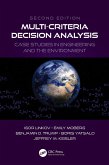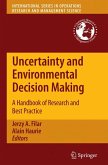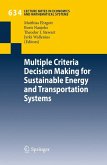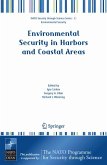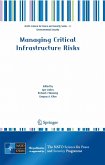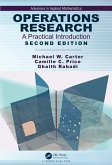Igor Linkov, Emily Moberg, Benjamin D. Trump, Boris Yatsalo, Jeffrey M. Keisler
Multi-Criteria Decision Analysis (eBook, PDF)
Case Studies in Engineering and the Environment
57,95 €
57,95 €
inkl. MwSt.
Sofort per Download lieferbar

29 °P sammeln
57,95 €
Als Download kaufen

57,95 €
inkl. MwSt.
Sofort per Download lieferbar

29 °P sammeln
Jetzt verschenken
Alle Infos zum eBook verschenken
57,95 €
inkl. MwSt.
Sofort per Download lieferbar
Alle Infos zum eBook verschenken

29 °P sammeln
Igor Linkov, Emily Moberg, Benjamin D. Trump, Boris Yatsalo, Jeffrey M. Keisler
Multi-Criteria Decision Analysis (eBook, PDF)
Case Studies in Engineering and the Environment
- Format: PDF
- Merkliste
- Auf die Merkliste
- Bewerten Bewerten
- Teilen
- Produkt teilen
- Produkterinnerung
- Produkterinnerung

Bitte loggen Sie sich zunächst in Ihr Kundenkonto ein oder registrieren Sie sich bei
bücher.de, um das eBook-Abo tolino select nutzen zu können.
Hier können Sie sich einloggen
Hier können Sie sich einloggen
Sie sind bereits eingeloggt. Klicken Sie auf 2. tolino select Abo, um fortzufahren.

Bitte loggen Sie sich zunächst in Ihr Kundenkonto ein oder registrieren Sie sich bei bücher.de, um das eBook-Abo tolino select nutzen zu können.
This thoroughly updated second edition provides seven additional new case studies focused on sustainability. Combining applications using MCDA methodologies with free DECERNS software package, this book is a great resource for professionals and students in learning and applying similar frameworks to other environmental projects.
- Geräte: PC
- mit Kopierschutz
- eBook Hilfe
Andere Kunden interessierten sich auch für
![Multi-Criteria Decision Analysis (eBook, ePUB) Multi-Criteria Decision Analysis (eBook, ePUB)]() Igor LinkovMulti-Criteria Decision Analysis (eBook, ePUB)57,95 €
Igor LinkovMulti-Criteria Decision Analysis (eBook, ePUB)57,95 €![Uncertainty and Environmental Decision Making (eBook, PDF) Uncertainty and Environmental Decision Making (eBook, PDF)]() Uncertainty and Environmental Decision Making (eBook, PDF)81,95 €
Uncertainty and Environmental Decision Making (eBook, PDF)81,95 €![Modelling of Environmental Chemical Exposure and Risk (eBook, PDF) Modelling of Environmental Chemical Exposure and Risk (eBook, PDF)]() Modelling of Environmental Chemical Exposure and Risk (eBook, PDF)73,95 €
Modelling of Environmental Chemical Exposure and Risk (eBook, PDF)73,95 €![Multiple Criteria Decision Making for Sustainable Energy and Transportation Systems (eBook, PDF) Multiple Criteria Decision Making for Sustainable Energy and Transportation Systems (eBook, PDF)]() Multiple Criteria Decision Making for Sustainable Energy and Transportation Systems (eBook, PDF)73,95 €
Multiple Criteria Decision Making for Sustainable Energy and Transportation Systems (eBook, PDF)73,95 €![Environmental Security in Harbors and Coastal Areas (eBook, PDF) Environmental Security in Harbors and Coastal Areas (eBook, PDF)]() Environmental Security in Harbors and Coastal Areas (eBook, PDF)177,95 €
Environmental Security in Harbors and Coastal Areas (eBook, PDF)177,95 €![Managing Critical Infrastructure Risks (eBook, PDF) Managing Critical Infrastructure Risks (eBook, PDF)]() Managing Critical Infrastructure Risks (eBook, PDF)161,95 €
Managing Critical Infrastructure Risks (eBook, PDF)161,95 €![Operations Research (eBook, PDF) Operations Research (eBook, PDF)]() Michael CarterOperations Research (eBook, PDF)46,95 €
Michael CarterOperations Research (eBook, PDF)46,95 €-
-
-
This thoroughly updated second edition provides seven additional new case studies focused on sustainability. Combining applications using MCDA methodologies with free DECERNS software package, this book is a great resource for professionals and students in learning and applying similar frameworks to other environmental projects.
Dieser Download kann aus rechtlichen Gründen nur mit Rechnungsadresse in A, B, BG, CY, CZ, D, DK, EW, E, FIN, F, GR, HR, H, IRL, I, LT, L, LR, M, NL, PL, P, R, S, SLO, SK ausgeliefert werden.
Produktdetails
- Produktdetails
- Verlag: Taylor & Francis eBooks
- Seitenzahl: 420
- Erscheinungstermin: 8. September 2020
- Englisch
- ISBN-13: 9781000177787
- Artikelnr.: 59981781
- Verlag: Taylor & Francis eBooks
- Seitenzahl: 420
- Erscheinungstermin: 8. September 2020
- Englisch
- ISBN-13: 9781000177787
- Artikelnr.: 59981781
- Herstellerkennzeichnung Die Herstellerinformationen sind derzeit nicht verfügbar.
Dr. Igor Linkov is the Risk and Decision Science Focus Area Lead with the US Army Engineer Research and Development Center, and Adjunct Professor with Carnegie Mellon University. Dr. Linkov has managed multiple risk and resilience assessments and management projects utilizing MCDA in many application domains, including critical infrastructure, environment, transportation, energy, homeland security and defense, supply chain and cybersecurity. He has published widely on environmental policy, environmental modeling, and risk analysis, including twenty books and over 350 peer-reviewed papers and book chapters in top journals. He is Elected Fellow with the American Association for the Advancement of Science (AAAS) and Society for Risk Analysis
Emily Moberg is a theoretical ecologist with degrees in environmental engineering and biological oceanography from MIT and Woods Hole Oceanographic Institution. She has worked on systems ranging from phytoplankton to fisheries and agriculture. She specializes in using optimization methods to better understand linkages between human behavior and natural resources.
Benjamin D. Trump is a governance scholar with specific interests in emerging technologies and complex systems. His work is global and comparative, including an ORISE Fellowship for the US Army Corps of Engineers in the United States, a Postdoctoral Research Fellowship the University of Lisbon (Portugal), and a Research Internship for the Institute of Occupational Medicine (Singapore). In 2016 Dr. Trump received his PhD from the University of Michigan in Health Services Organization and Policy.
Boris I. Yatsalo is Professor and Head of Information Systems dept. at the Institute of Intelligent Cybernetic Systems of the IATE National Research Nuclear University MEPHI, Obninsk-Moscow. He has been managing several international projects on developing models and computer systems for optimization of protective measures on radioactively contaminated lands. His thesis in 2004 was devoted to creation and application of GIS-based Decision Support Systems within remediation of contaminated territories. He has published more than 90 papers in Russian and international journals, book chapters and conferences. His interests include Multi-Criteria Decision Analysis (MCDA) and management, specifically Fuzzy MCDA and Fuzzy Intelligent Systems.
Jeffrey Keisler is Professor of Management Science and Information Systems at the University of Massachusetts Boston. He is an expert in Decision Sciences, in which he earned a PhD at Harvard, and has 30 years experience in industry, government, consulting and academic settings. He has published nearly 70 journal articles and two books on methodological and applied topics. He served as President of the INFORMS Decision Analysis Society and as President of the Specialty Group on Decision Analysis and Risk within the Society for Risk Analysis, and was awarded the Decision Analysis Society's Publication Award for his co-edited book "Portfolio Decision Analysis" and was named a Fulbright Distinguished Chair.
Emily Moberg is a theoretical ecologist with degrees in environmental engineering and biological oceanography from MIT and Woods Hole Oceanographic Institution. She has worked on systems ranging from phytoplankton to fisheries and agriculture. She specializes in using optimization methods to better understand linkages between human behavior and natural resources.
Benjamin D. Trump is a governance scholar with specific interests in emerging technologies and complex systems. His work is global and comparative, including an ORISE Fellowship for the US Army Corps of Engineers in the United States, a Postdoctoral Research Fellowship the University of Lisbon (Portugal), and a Research Internship for the Institute of Occupational Medicine (Singapore). In 2016 Dr. Trump received his PhD from the University of Michigan in Health Services Organization and Policy.
Boris I. Yatsalo is Professor and Head of Information Systems dept. at the Institute of Intelligent Cybernetic Systems of the IATE National Research Nuclear University MEPHI, Obninsk-Moscow. He has been managing several international projects on developing models and computer systems for optimization of protective measures on radioactively contaminated lands. His thesis in 2004 was devoted to creation and application of GIS-based Decision Support Systems within remediation of contaminated territories. He has published more than 90 papers in Russian and international journals, book chapters and conferences. His interests include Multi-Criteria Decision Analysis (MCDA) and management, specifically Fuzzy MCDA and Fuzzy Intelligent Systems.
Jeffrey Keisler is Professor of Management Science and Information Systems at the University of Massachusetts Boston. He is an expert in Decision Sciences, in which he earned a PhD at Harvard, and has 30 years experience in industry, government, consulting and academic settings. He has published nearly 70 journal articles and two books on methodological and applied topics. He served as President of the INFORMS Decision Analysis Society and as President of the Specialty Group on Decision Analysis and Risk within the Society for Risk Analysis, and was awarded the Decision Analysis Society's Publication Award for his co-edited book "Portfolio Decision Analysis" and was named a Fulbright Distinguished Chair.
Multi-Criteria Decision Analysis: Methods and Applications. MCDA Methods in
Depth: Sediment Management. MCDA Application in Depth: Nanomaterials. MCDA
Application Case Studies: Setting Dredging Windows for Sensitive Fish
Species. Management of Harmful Algal Blooms. Restoring Oysters in
Chesapeake Bay. Performance Metrics for Oil Spills Response.
Nanoremediation and Synthetic Bioremediation. Evaluating Cruise Ship Roots
to Venice. Mining and Sustainability in the High Arctic. Sustainable
Roofing Technology. Power Supply Alternatives. Material Selection for Auto
Sustainability. Value of Information and Portfolio Analysis for
Nanomaterial Hazard Reclassification.
Depth: Sediment Management. MCDA Application in Depth: Nanomaterials. MCDA
Application Case Studies: Setting Dredging Windows for Sensitive Fish
Species. Management of Harmful Algal Blooms. Restoring Oysters in
Chesapeake Bay. Performance Metrics for Oil Spills Response.
Nanoremediation and Synthetic Bioremediation. Evaluating Cruise Ship Roots
to Venice. Mining and Sustainability in the High Arctic. Sustainable
Roofing Technology. Power Supply Alternatives. Material Selection for Auto
Sustainability. Value of Information and Portfolio Analysis for
Nanomaterial Hazard Reclassification.
Multi-Criteria Decision Analysis: Methods and Applications. MCDA Methods in
Depth: Sediment Management. MCDA Application in Depth: Nanomaterials. MCDA
Application Case Studies: Setting Dredging Windows for Sensitive Fish
Species. Management of Harmful Algal Blooms. Restoring Oysters in
Chesapeake Bay. Performance Metrics for Oil Spills Response.
Nanoremediation and Synthetic Bioremediation. Evaluating Cruise Ship Roots
to Venice. Mining and Sustainability in the High Arctic. Sustainable
Roofing Technology. Power Supply Alternatives. Material Selection for Auto
Sustainability. Value of Information and Portfolio Analysis for
Nanomaterial Hazard Reclassification.
Depth: Sediment Management. MCDA Application in Depth: Nanomaterials. MCDA
Application Case Studies: Setting Dredging Windows for Sensitive Fish
Species. Management of Harmful Algal Blooms. Restoring Oysters in
Chesapeake Bay. Performance Metrics for Oil Spills Response.
Nanoremediation and Synthetic Bioremediation. Evaluating Cruise Ship Roots
to Venice. Mining and Sustainability in the High Arctic. Sustainable
Roofing Technology. Power Supply Alternatives. Material Selection for Auto
Sustainability. Value of Information and Portfolio Analysis for
Nanomaterial Hazard Reclassification.

